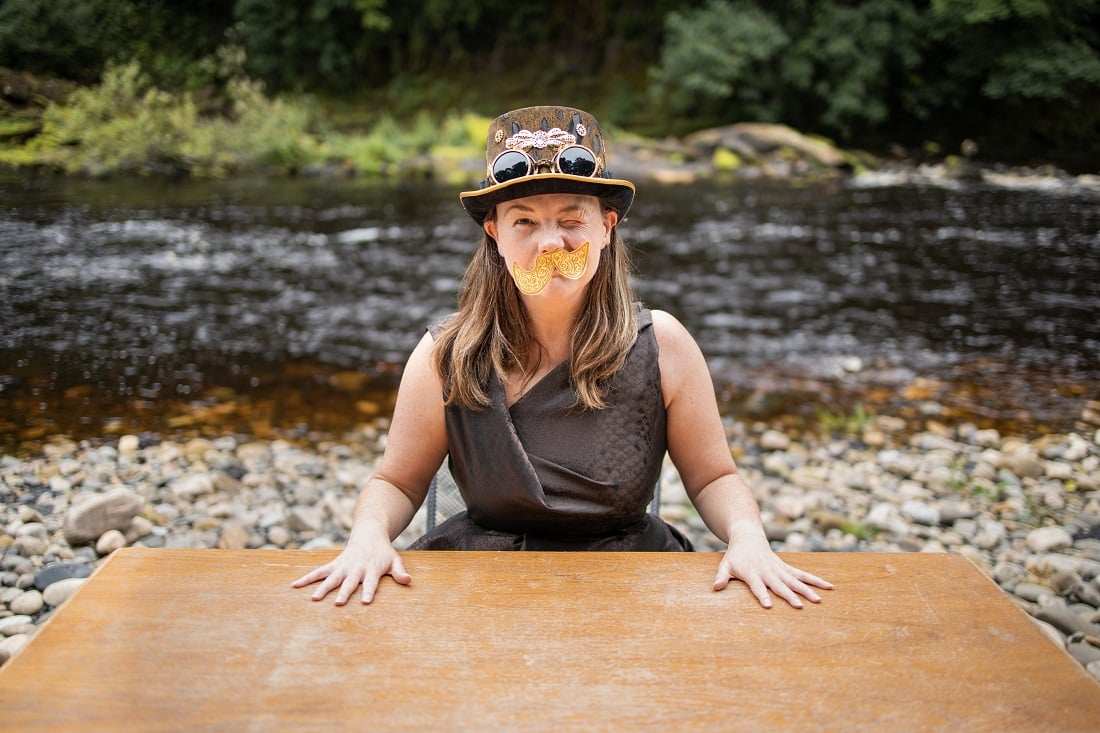
Photo: Rob Irish
Turning limitations into possibilities
Disabled freelancers can teach the sector a lot about how to overcome limitations to make and adapt work in new and exciting ways, so look for them, use them … and pay them, says Lisette Auton.
I say I Do Stuff With Words. It covers everything without having to name all the words-work I do, which is a lot, because I have a lot of catching up to do. And, if I’m honest, I do too much of it because I’m terrified of vanishing again.
I spent years in a darkened box-room after impairment struck. I’d studied Devised Performance at Bretton Hall. I was going to change the world – and then, I wasn’t. I disappeared from view, and most importantly, from the cultural landscape and narrative.
The forgotten
According to the Papworth Trust, 25% of people in the North East are disabled. I’m one of them. One of the reasons I was missing for so long was because I didn’t know how to be a disabled person and a creative at the same time. Mostly because I wasn’t seeing anyone who showed me it was possible.
I was commissioned by New Writing North and the North East Culture Partnership to write an essay for their New Narratives of the North East project which I based upon this provocation: if 25% of people in the North East are disabled, why do we not take up that cultural space?
Coronavirus has had a disproportionate effect on the disabled community, both as a risk to health and lives, but also as a risk of being side-lined (again) from the mainstream arts sphere. Disabled women are over 11 times more likely to die of Coronavirus than their non-disabled counterparts. You can forgive me therefore, if finally having claimed some visibility, I’m scared of coming back out to play.
And this is where our industry has the chance to formulate plans and ensure disabled creatives, who have been labelled ‘vulnerable’; who have had Do Not Resuscitate orders placed upon them against their will; who may have been shielding and in many cases still are; are not forgotten – again.
Take the money… and pay
It’s not just about making sure that these missing creatives are reinstated fully and with care; it goes further than that. It’s about instating them in the first place. Have a look at your board and see who is missing. Then do something about it.
There is a phrase in disability activism which resonates deeply with me: ‘Nothing about us, without us.’ If I may be so bold as to make an addition: without paying us. It is the woe of a freelancer to be the only person around the table who is unsalaried and therefore giving their time for free. It is the woe of the disabled freelancer to not only be that person, but also be simultaneously a tick box and a free source of all accessibility knowledge, and the one who finds that the table is inaccessible. Although you’ve said the same thing in numerous ways too many times to count, you appear to be saying it all over again.
Pay disabled artists for their creative work and their expertise. Pay disabled equality strategists to work with your teams, your organisation, then act on it. This is not a choice, it is enshrined in law to make it accessible. Why are we still having these conversations now? Programme disabled artists, work with disabled creative practitioners. Do not see accessibility as a chore; see it as a welcome to a new (paying) audience, an extension of your creativity, a bold challenge and opportunity to further your artistic palette. When you’re making an Arts Council bid there is a whole budget line for access costs. In addition to your bid. Take the Arts Council’s money and spend it on disabled creatives to teach you, work with you, empower you, and enable you to meet the access costs of working with disabled artists. I guarantee, we are worth it.
A call to action
New Writing North read my essay and took it as a call to action. They gave me a commission to make a film for Durham Book Festival, a budget, and most importantly, full creative control. I immediately commissioned another three disabled artists – Bex Bowsher, Sarah Crutwell and Vici Wreford-Sinnott. There are tremendous disabled artists in the North East and beyond, and tremendous disabled-led film and theatre organisations. We are here, I promise. You just have to look a bit harder to find us, because more often than not, we’re not on your main stage. ‘Writing the Missing: A River Cycle’ is not just a call to action but a showcase of Disability Arts and an example of the creative freedoms and wonders this can offer, when disabled artists are handed control. It is online at Durham Book Festival so please come and join me at the river. Don’t let me vanish.
Because now, you’re going to have to look even harder to find us. Because we will not be as visible and we need you to not forget us – to make ways to bring us into the room and to the table when we can’t be physically in that space. We’ve spent 6 months getting to grips with Zoom, suddenly making accommodations that for years disabled people have been arguing for. Let’s not lose all that learning. We’ve also got a heck of a lot to teach you about how to make and adapt work in new and exciting ways within limitations – it’s what we’ve been doing all along.
Except we don’t see them as limitations, we see them as possibilities.
Lisette Auton is a freelance writer, performer and disability activist who ‘Does Stuff With Words’
![]() lisetteauton.co.uk
lisetteauton.co.uk
![]() @lisette_auton
@lisette_auton
‘Writing the Missing: A River Cycle’ is online at Durham Book Festival.
Join the Discussion
You must be logged in to post a comment.